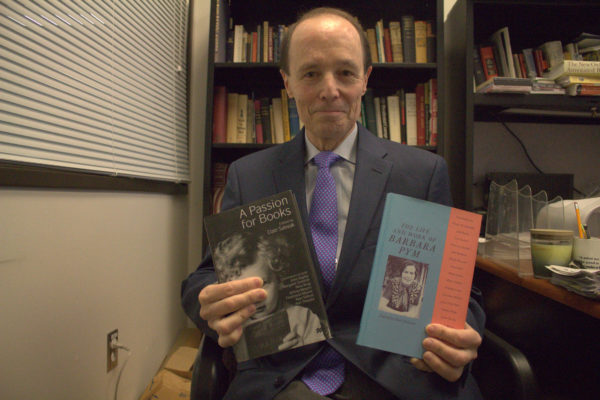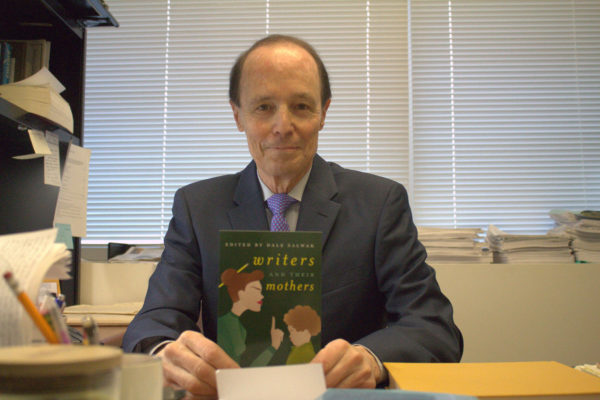![]() Citrus College professor of English Dale Salwak grinds a new lens for reading literature: authors’ mothers. The project’s ambition, to tackle the maternal influence on writers, is staggering. Salwak gained submissions from Anthony Thwaite, David Updike, Ian McEwan and Martin Amis, among others.
Citrus College professor of English Dale Salwak grinds a new lens for reading literature: authors’ mothers. The project’s ambition, to tackle the maternal influence on writers, is staggering. Salwak gained submissions from Anthony Thwaite, David Updike, Ian McEwan and Martin Amis, among others.
“These are all people I am acquainted with, some I have known many years,” Salwak said. “I use a shotgun approach, send messages to about 50 people, figuring, I’d get about half.”
Biographical details on William Shakespeare, Louisa May Alcott, Sylvia Plath, Samuel Beckett and Philip Larkin surprise as much as they inspire.
Sylvia Plath tortured her mom with the prospect of suicide, as she did with everyone else in her family. She killed herself with her two children in the next room. Louisa May Alcott tortured herself to please her mother, Abigail, who lived vicariously through Louisa’s career.![]()
Art critic John Ruskin’s mom moved to college with him. Samuel Beckett could not escape his mother, who thrilled at the chance to visit his frequent sickbed.

The reader starts comparing the authors’ relationships to their own.Are you a Larkin, who along with mother Eva, celebrated independence from their late patriarch; or a Robert Lowell, whose career was part rebellion against “mother” and part-restoration of the memory of “daddy?”
The book features several autobiographical revelations. Ian McEwan and his mother Rose both suffer from a hesitation to speak. Their anxiety developed while living in the house of Sgt. David McEwan.
“I was like her, too tongue-tied to face down his iron certainties,” McEwan wrote. The novelist agonizes over his mother’s attempt to change her accent in high company.
One of several inspirations for Salwak’s work was a challenge posed by Alexander McCall Smith in his book on W.H. Auden.
“There may be no book on the mothers of poets,” Smith wrote. The astonished reader asks, “Why?” The maternal relationships of the authors in the book span every distinction of class, faith and parental bond.
Larkin’s mom, whom he called “dearest creature” in correspondence, was the only reliable woman in his life. Walt Whitman could not recover from his mother’s death.[perfectpullquote align=”right” cite=”” link=”” color=”” class=”” size=””]There were a whole generation of writers coming out of World War II that really transformed the novel in ways such that we have not seen since.
– Dale Salwak[/perfectpullquote]
“We have been great chums: always next to each other: always,” Whitman wrote.
Whitman’s biography notes that both he and his mother exchanged regular letters describing their illnesses. Whitman’s Pulitzer Prize winning biographer, Kenneth Silverman, was doing chemotherapy at the time. Silverman never revealed secrets he uncovered while writing “Houdini!” another biography of the magician.
Salwak, who is also a magic enthusiast and performer was friends with Silverman for thirty years before working with him on “Writers and Their Mothers.”
“This was his last piece of writing before he died,” Salwak said.
Salwak’s striking collection is a who’s who of literary peerage.
“A lot of my research has been on that group, they grew out of the ’50s, the so-called ‘angry young men,'” Salwak said.
“There were a whole generation of writers coming out of World War II that really transformed the novel in ways such that we have not seen since.”
While focusing on writers of English, the book is distinctly Anglo and American. One would like to see the Indian literary celebrities dominating English publishing, such as Arundhati Roy or Salman Rushdie, if they could be got.
“That’s the problem with something like this,” Salwak said. “There are so many areas to explore it would just become a baggy monster.”
Ernest Hemingway, who was raised by his mother as a girl before age 6, did not make the cut. But we learn from Judy Carver that her father, William Golding, confessed a desire to be a girl as a child and lived in awe of women’s intuitive power.
“Witchcraft, he would mutter again, and I don’t think he was joking,” Carver wrote.

Salwak has assembled a collection other writers and biographers can now mine for material. The importance of the maternal bond, for good or ill, is the most remarkable discovery of the compilation.
Organizing thoughts in words is a reflective act. Scouring the mind for language, invoking one’s “voice,” cannot be done without hearing a mother’s sighs, scolds and soothing coos.
Matriarchs in the book are “cruel,” “charming,” or “suffocating.” Some spread their ambition to their children, as Shakespeare’s mom, and some try to break their spirits, as Charlotte Lowell did to her son, Robert.
Stepmother Elizabeth Jane Howard had an “exotic” touch to guide the hand of a “semi-literate truant,” as Martin Amis described himself. Amis credits her with a more important role in his literary development than his famed father, Kingsley Amis.
All the mothers are connected by their significance in their children’s lives. Fathers may or may not teach by example, but mothers, even in resentment, listen. And for a budding writer, what more could they ask for than an audience? Salwak’s own mother shaped his career as well.
“Without any doubt. (My mother) has always been an avid reader, she has read everything I’ve ever done and saved me from lots of stylistic embarrassment,” Salwak said.
“Writers and Their Mothers” is available at https://www.palgrave.com for $24.99.


